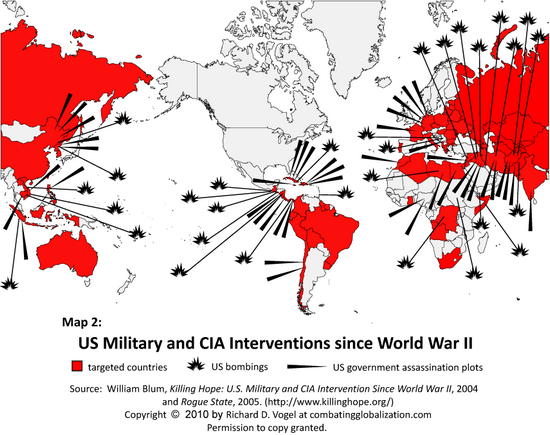Aerial Bombardment.
If you tried to make a list of the nations our bombers, fighters and drones have attacked in the hundred years that there has even been such a thing as military air power, you would quickly find it to be an almost impossible task. The list is so long it's mind boggling. And when you add to the list all the other nations that have endured aerial bombardment by other nations (or even their own feckless government), and you will find that virtually all societies, in just the last several generations, know that particular terror. But we, alone among modern nations, have never experienced air attacks on our soil.
Foreign Invasion/Occupation.
Europe is the poster child for this horrific experience, but one cannot forget that throughout Asia, the sub-Continent, Africa and Latin America it has been a regular experience, with all the brutality and slaughter that comes directly from an enforced occupation.
Nuclear Coercion.
This is simple. We were the first to develop nuclear weapons. To this day still the only nation to use them in anger. We have been threatening the entire world with apocalyptic destruction for sixty years, and have NEVER, not for one second, known the feeling of being defenseless before a nuclear threat. Oh, we have feared our own holocaust - but only with the knowledge that any attacker would be signing their own death warrant.
Insurgency.
Yes. The Civil War was an insurgency. But how many nations have suffered the slow bleeding of a low level internal conflict, and the brutality of draconian police measures that always result, just in the last fifty years? Yes, the Civil War was horrific, but with modern weapons and modern technology, insurgency is easier, more lethal and requires fewer committed rebels. 1865 was so long ago as to be meaningless.
* * *
If Venezuela had nuclear missiles and the US did not, can you imagine any scenario where the US didn't throw out the IAEA inspectors, abrogate the NPT and go for broke to build a nuclear deterrent? How can we expect the Iranians, or for that matter the Syrians, Saudis or Egyptians to stand confronted by a nuclear armed Israel when we KNOW we would not be willing to do the same thing ourselves? Wouldn't it be more aligned with our professed values to pressure Israel to give up their illegal weapons then to try and prevent other nations legally developing their own nuclear capabilities? Wouldn't it actually reduce the likelihood of a nuclear attack if there was a more balanced nuclear presence in the region?
Where is the value in loudly and publicly declaring China our next great adversary? Do we really NEED a great adversary all the time? Isn't it possible to have a world where the great powers do not divide themselves into warring coalitions, but rather compete to increase trade, wealth and global quality of life? Why is that so incomprehensible? How might China, in her role as grand adversary, go about harming the US without destroying herself in the process? Wars are destructive for trade - they reduce global demand, divert resources from commerce to war-making, and they reduce access to all manner of raw materials. And if the fear is that China will use force to re-take possession of Taiwan, that's just silly. They want Taiwan intact, with all its wealth, not an economic and human basket case of smoldering ruins and shattered infrastructure. And the Chinese know that it is inevitable, a matter of time only, before Taiwan chooses to rejoin the mainland all on its own. There is no other path for them, and even now, this is becoming clear.
All around the world, we are seeing the rapidly eroding utility of military force. The US invasions of both Iraq and Afghanistan were very brief, overwhelming military victories followed by long, grinding, bloody debacles. Nothing was gained in either case, and a great deal was lost. Not the least of which was a global perception of US military superiority. Every nation now understands, from China to Syria to Sudan, that the US can defeat their military, but that won't achieve their aims, and they can be bled out in a long insurgency. The US, on the other hand, is still locked in a World War II mindset, building huge, heavy tank brigades and powerful air forces to defeat - who, exactly? There are exactly two kinds of warfare possible in the modern era, and we are seeing them both. Most common is the war between a government and it's people - a rebellion as we see in Syria and before that, Libya, or a civil war as in Afghanistan and Pakistan. Typically these sorts of insurgencies pit a much better armed and funded government against a smaller, weaker foe, and they are fought in a series of ambushes, bomb blasts, kidnapping, assassinations, torture and executions. They last for years or decades, because there is no clear cut way for them to end - no path to anything that might be described as "victory". The other kind of war is the kind the US is fighting all over the world. No matter what you believe about the morality of drone strikes and special operations raids, there is very little doubt about their efficacy. They are merely an extension of the tactics of terrorism - designed to create fear to achieve primarily political ends. There have always been elite fighters in every culture, and much of the advanced technology used in drones is software, and therefore available to any nation, so this kind of warfare will soon become commonplace around the world, and make no mistake, it will be used against the US.
All apropos of nothing I suppose, and unlikely to lead to anything revelatory, but I think, when you get past our indoctrination and the fog of lies about American Exceptionalism and "False Equivalence", there's something important here to be learned about who we are. We are an optimistic and inventive people, certainly, but that optimism, coupled with a geographic location rich in resources and virtually invulnerable to military attack, seems to have lead to a kind of a cruel nationalism, an inward-focused hubris that allows us to forgive virtually any criminal act, as long as it was committed by Americans. Where all cultures have a great capacity for ethnic hatred, and all religions are steeped in a particularly irrational loathing of "unbelievers", Americans, with their unique history, couple a kind of hyper-tribalism with a dangerous belief that violence is a perfectly appropriate approach to conflict resolution.
It is nothing short of astonishing that we, as a people, are not hated and feared much more than we are...





